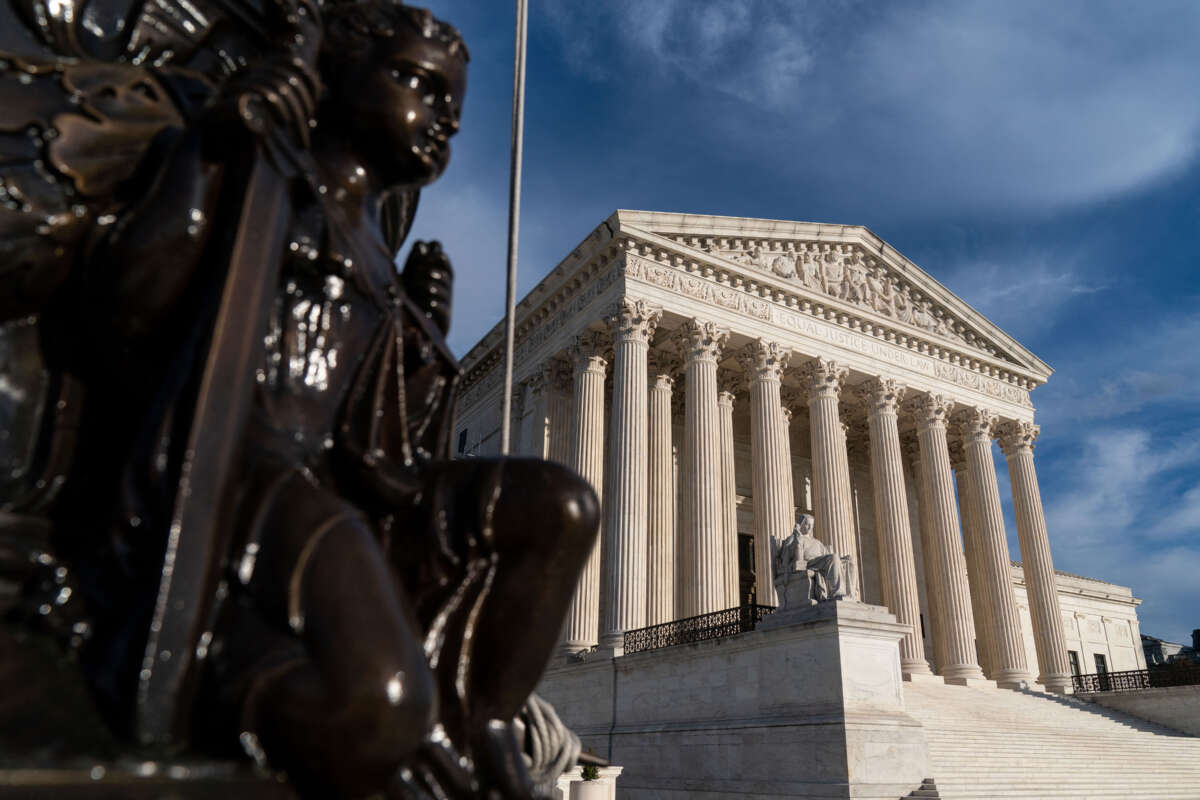The Supreme Court has agreed to take up a case brought against a consumer protection agency that could unleash a deluge of abusive financial practices onto the public, and threaten to end entire welfare programs like Social Security and Medicare.
On Monday, the Supreme Court took up a case brought by payday lender lobbyists after conservatives on the Fifth Circuit Court of Appeals agreed with the lenders last year that the funding mechanism for the Consumer Financial Protection Bureau (CFPB) is unconstitutional — a ruling that legal experts have slammed as blatant judicial activism.
If the Supreme Court upholds that decision, it could see the end of the CFPB, an agency created in the wake of the 2008 global recession to protect consumers from corporate fraud and abusive practices and stabilize the banking industry. Depending on the justices’ ruling, the decision could also see the end of a wide swath of other programs upon which millions of Americans — and the economic foundation of the country itself — rely.
Left-leaning advocates have raised alarm over the case.
“The Fifth Circuit’s radical ruling on the CFPB’s funding structure isn’t just bad, ahistorical jurisprudence — it is a naked attempt by corporate fraudsters to destroy” the only mechanism in place to protect consumers, said Vishal Shankar, researcher with the Revolving Door Project, who pointed out that Republican backers of the case and the judge who wrote the decision have received financial contributions from Wall Street bankers whose institutions are often in the CFPB’s crosshairs.
“If the Supreme Court has any respect left for the rule of law, it should overturn the Fifth Circuit’s radical act of right-wing judicial activism,” Shankar said.
The Constitutional Accountability Center deemed the case “incredibly dangerous,” writing in a blog post in October that the Supreme Court could “invite challenges to a host of other federal financial regulators and could wreak havoc on the nation’s economy” if it upheld the Fifth Circuit’s decision.
The plaintiffs in the case have argued that the unconstitutionality of the CFPB’s funding lies in the fact that it is funded outside of congressional appropriations, and instead gets funding directly from the Federal Reserve. The Democrats who created the agency structured it this way in order to shield it from political attacks from bank-allied conservatives and Republicans, who have long sought to weaken or abolish the agency.
CFPB oversees a host of regulations, with the goal of protecting consumers from the banking and financial industry’s most predatory practices. One of its most prominent cases in recent years was its scrutiny of Wells Fargo for the bank’s alleged use of customers’ profiles without their consent to create millions of fake accounts and more.
The more mundane regulations that CFPB oversees have an impact on people’s daily financial transactions. Payday lenders, for instance, have long had a bone to pick with the CFPB for its attempts to rein in payday loans — a particularly predatory type of loan targeted toward the most vulnerable populations, often trapping the poorest borrowers into debt.
Thus, one outcome of the CFPB potentially being defunded is that it could be open season by payday lenders on people in desperate need of cash. Other outcomes could include a destabilization of the mortgage market, an end to the Biden administration’s initiatives to reduce so-called junk fees, and the sapping of billions of dollars from the public to fraudsters and groups looking to make a quick buck with abusive practices and scams.
Perhaps even more concerningly, the case could see the funding structure of about a third of the federal government deemed unconstitutional, according to the Project on Government Oversight. As The American Prospect’s David Dayen wrote, there are numerous other crucial programs and regulators that are funded in a similar manner to CFPB, and an enterprising conservative Supreme Court justice could potentially seek to nix the funding mechanisms of those programs too.
“The plain logic of the Fifth Circuit is that only Congress can authorize appropriations directly from general fund revenues. Any other system of funding agencies or programs is questionable. So say goodbye to the [Federal Deposit Insurance Corporation (FDIC)], the [Food and Drug Administration (FDA)], and the Fed on the agency side, and all mandatory programs like Social Security on the spending side,” Dayen wrote in October.
“The bottom line is that a creative and determined conservative judge could easily state that the plain language of the Constitution rejects all mandatory spending, making Social Security, Medicare, food stamps, welfare benefits, and more illegal,” Dayen continued.
Join us in defending the truth before it’s too late
The future of independent journalism is uncertain, and the consequences of losing it are too grave to ignore. To ensure Truthout remains safe, strong, and free, we need to raise $27,000 in the next 24 hours. Every dollar raised goes directly toward the costs of producing news you can trust.
Please give what you can — because by supporting us with a tax-deductible donation, you’re not just preserving a source of news, you’re helping to safeguard what’s left of our democracy.
